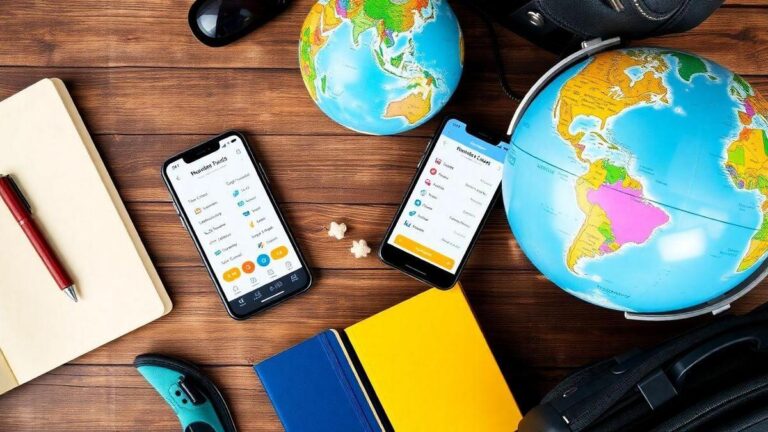Impact of language proficiency on understanding cultural nuances abroad
The impact of language proficiency on understanding cultural nuances abroad is huge! When you learn a new language, you open doors to new cultures. You can make friends, share stories, and really connect with people. This article will guide you through how knowing a language helps with cross-cultural communication and why it’s important to be culturally sensitive. Get ready to explore how language skills build deeper connections and enrich your experiences around the world!
Key Insights
- Understanding language helps you connect with locals.
- Speaking the language shows respect for the culture.
- You can pick up on small cultural details easier.
- Misunderstandings decrease with better language skills.
- Your travel experience becomes more enjoyable and meaningful.
The Role of Language Proficiency in Cultural Understanding
How Language Skills Enhance Cross-Cultural Communication
When you travel or move to a new country, language skills can be your best friend. Imagine walking into a café and ordering your favorite drink in the local language. It’s not just about getting what you want; it’s about making a connection with the people around you. Speaking the local language opens doors to deeper conversations and helps you understand their culture better.
Here are some ways language skills can help you connect:
- Building Trust: People appreciate when you try to speak their language. It shows you care about their culture.
- Avoiding Misunderstandings: Knowing the language helps you avoid confusion. You can ask questions and clarify things easily.
- Sharing Stories: Language lets you share your own stories and hear theirs, creating bonds that last.
The Importance of Cultural Sensitivity in Expatriate Experiences
Cultural sensitivity is key for anyone living abroad. It’s about understanding and respecting local customs and traditions. When you are sensitive to cultural differences, you can avoid stepping on toes. For example, in some cultures, a simple greeting can mean a lot. If you understand this, you can make friends more easily.
Here are a few tips for being culturally sensitive:
- Observe Local Customs: Take time to learn what is acceptable and what isn’t.
- Ask Questions: If you’re unsure, don’t hesitate to ask locals for guidance.
- Be Open-Minded: Embrace differences and be willing to adapt your behavior.
Building Connections Through Language Proficiency
Language proficiency is like a bridge that connects you to others. When you speak the language, you can engage in conversations that matter. You might discuss local traditions, share laughs, or even learn about someone’s family history. These moments create strong ties and friendships.
| Language Skills | Benefits |
|---|---|
| Basic Vocabulary | Helps in everyday conversations |
| Listening Skills | Improves understanding of context |
| Conversational Skills | Encourages deeper connections |
When you invest in learning a language, you’re not just learning words. You’re learning how to connect on a human level. This connection is what makes your experience abroad truly special.
Immersion Learning and Its Impact on Cultural Nuances
Why Immersion Learning Boosts Language Proficiency
When you dive into a new language, you’re not just learning words; you’re connecting with people. Immersion learning places you right in the thick of it, where you can hear, speak, and feel the language all around you. This hands-on approach helps you pick up phrases and slang that textbooks can’t teach.
Think about it: when you hear someone speak a language in a café, you catch the rhythm and tone. You start to mimic it. This is how immersion boosts your language skills. You learn faster because you’re using the language in real life.
Real-Life Examples of Cultural Comprehension Through Immersion
Imagine you’re in a bustling market in Mexico. The sounds, the smells, and the people all around you create a rich experience. You ask a vendor about their spices, and suddenly, you’re experiencing the culture.
Here are a few ways immersion helps you understand cultural nuances:
| Scenario | Cultural Insight |
|---|---|
| Ordering food in Italy | Understanding local dining etiquette |
| Attending a festival in Japan | Learning about traditions and community values |
| Participating in a family gathering in Brazil | Discovering the importance of family ties |
By stepping into these situations, you’re not just a spectator; you’re part of the story. You grasp the cultural nuances that come with language, making your experience richer.
Exploring New Cultures with Language Skills
When you learn a language through immersion, you open doors to new cultures. It’s like having a key to a treasure chest filled with stories, traditions, and friendships. You can travel to new places and communicate with locals, which makes your journeys unforgettable.
For example, speaking French in Paris allows you to chat with locals about their favorite spots, leading to hidden gems that tourists often miss. This connection transforms your trip from a simple vacation to a memorable adventure.
The Benefits of Linguistic Diversity in Global Interactions
How Understanding Culture Fosters Better Relationships
When you dive into a new culture, you’re not just learning words; you’re opening a door to better relationships. Imagine chatting with someone from another country. If you understand their culture, you can connect on a deeper level. You might discover shared values or even laugh at the same jokes!
For instance, let’s say you’re talking to someone from Japan. If you know that bowing is a form of respect there, you can show appreciation. This small gesture can make a big difference in how you relate to each other.
The Connection Between Language Proficiency and Cultural Nuances
Language proficiency is like a bridge that connects you to cultural nuances. The more you know a language, the better you can understand its subtleties. This means you can pick up on things like humor, traditions, and even body language.
Here’s a quick look at how language skills impact cultural understanding:
| Language Skill Level | Understanding of Culture | Example |
|---|---|---|
| Basic | Limited | Simple greetings, basic customs |
| Intermediate | Moderate | Some idioms, traditions, and gestures |
| Advanced | Deep | Nuanced humor, cultural references, and complex traditions |
When you grasp these nuances, you’re not just speaking; you’re engaging in a meaningful conversation.
Embracing Linguistic Diversity for Deeper Connections
Embracing linguistic diversity can lead to deeper connections. Think about it: when you learn a new language, you’re not just expanding your vocabulary. You’re also stepping into someone else’s shoes. This can create empathy and understanding, making you more relatable.
Here are a few tips to embrace linguistic diversity:
- Learn a few phrases in another language. It shows effort and respect.
- Attend cultural events in your area. Experience the language in action!
- Make friends with people from different backgrounds. Share stories and learn from each other.
By taking these steps, you can build bridges and foster friendships that span the globe.
Frequently Asked Questions
How does language proficiency affect cultural understanding abroad?
Language proficiency boosts your ability to grasp cultural subtleties. The better you speak the language, the more you pick up on local customs and traditions.
Why is it important to learn local phrases when traveling?
Learning local phrases helps you connect with people. It shows respect for their culture and helps you dive deeper into their way of life.
Can I still understand cultural nuances if I know just a little of the language?
Yes, knowing even a little bit helps. You can still catch important cues and vibes. However, more language skills mean a richer experience.
How does language proficiency improve my interactions with locals?
When you’re proficient, communication becomes smoother. People will open up more, sharing their culture and stories with you.
What is the impact of language proficiency on understanding cultural nuances abroad?
The impact is significant. Language shapes thoughts and feelings. Understanding the language enhances your grasp of cultural nuances, making travel more fulfilling.

Hey, I’m Paula — traveler, language nerd, and the curious mind behind znewz.com. I’ve always believed that real connections happen through words, gestures, and shared experiences — not algorithms. That’s why I created this blog: to share travel stories from around the world and explore how language helps us connect in ways that AI still can’t. Whether I’m getting lost in a tiny town or striking up a chat in a language I barely know, I’m here to show that sometimes the best moments happen when tech takes a back seat.






